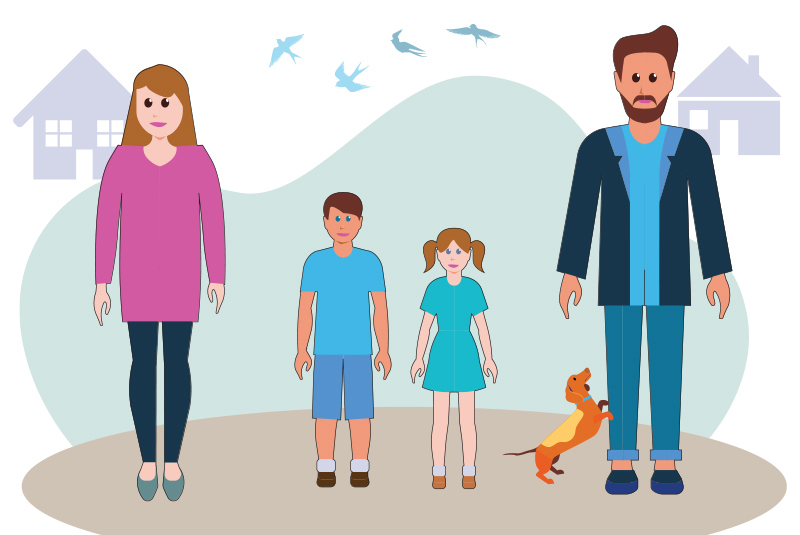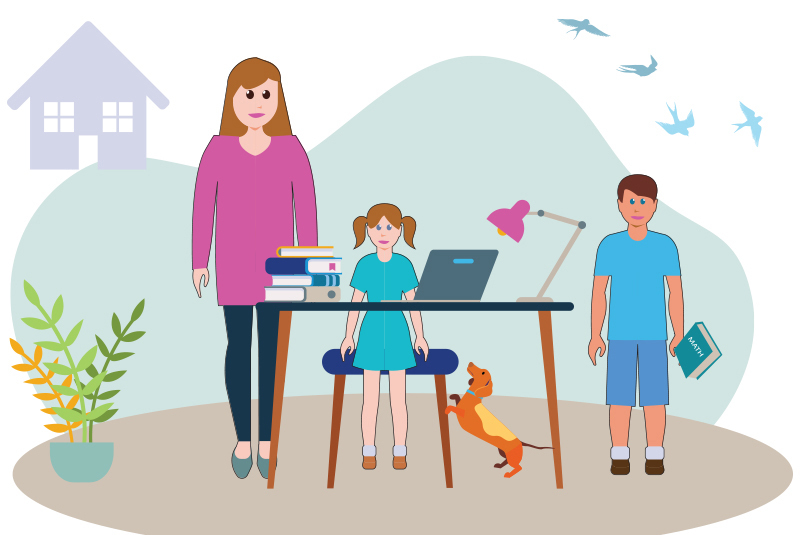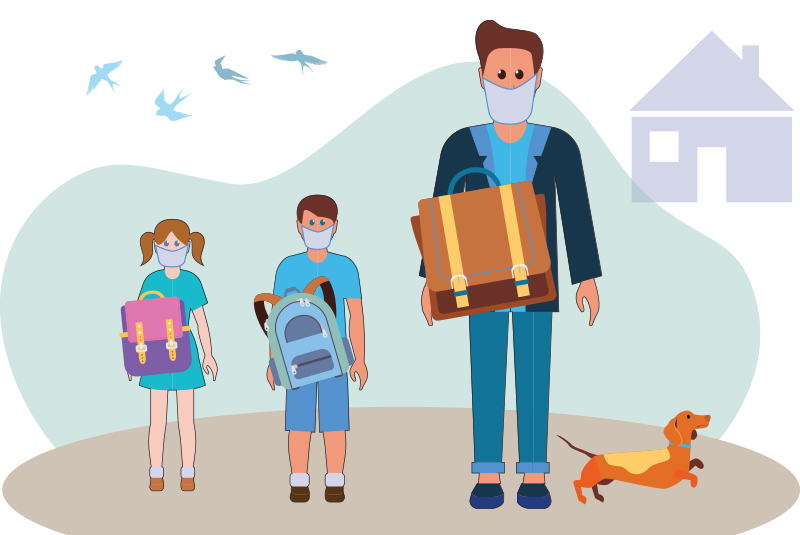Back to school and COVID-19: Tips for divorced parents

Fall 2020 will go down in history as one of the most complicated back-to-school seasons ever. The uncertainties of the academic year and COVID-19 have put parents in a bind: how to give kids the benefits of in-person learning without putting them — or the rest of the family — at risk of infection. For divorced parents, the year ahead promises to be even more complicated.
Open communication and co-parenting will be critically important, says Allison Scobie-Carroll, senior director of Social Work and Family Services. “Whether they separated recently or a long time ago, parents need to work together to help their kids feel safe and secure in this uncertain situation.”
Granted, that’s a tall order. COVID-19 and divorce are major stressors that have turned many peoples’ lives and daily routines upside down. Putting children’s emotional stability first is not easy when parents are at odds with each other. But children need to know they can rely on their parents to help them ride out the ups and downs of the 2020-21 school year.
Co-parenting tips for divorced parents as children return to school
The principles of co-parenting, such as working together to ensure kids’ well-being and not putting children in the middle of disagreements, can help parents help their children. “If divorced or separated parents can rely on each other to keep their kids safe, that will reduce both stress and risk for everyone,” says Scobie-Carroll.

1. Communicate on a regular schedule
The coming school year may require you and your ex to communicate more than usual, possibly more than you want to. Scobie-Carroll recommends regular, predictable check-ins to compare notes on your children’s well-being and make sure the current plan still makes sense.
2. Plan to be flexible
COVID-19 may force your family’s daily routines to change several times this coming school year. School districts could switch to 100 percent remote learning if infection rates go up. You or your ex-spouse’s employment could change. Custody arrangements that worked when kids went to school five days a week may not be possible if kids are taking classes at home.

“Try to recognize that many of us have very little control right now,” says Scobie-Carroll. She recommends making short-term plans that parents agree on and share with their kids. For now, the best plans will come with a built-in understanding that things could change tomorrow or next week. Not being ready for change is a setup for frustration.
3. Agree on safety
If your children go back and forth between homes, it’s important that both households have the same ground rules about safety. You might enforce the rules differently, but try to agree on the fundamentals of handwashing, face coverings, and physical distancing. Let your children know that you both expect them to follow their school’s infection-control protocols so there’s no question in their minds that you mean it.
4. Set consistent guidelines on schooling
While some children have thrived with remote learning, many others have struggled to adapt to taking classes without seeing teachers or friends in person. It’s not surprising that many parents have had to adjust their academic expectations. Likewise, you and your ex-spouse may have to relax your pre-COVID-19 standards for your kids this year.

“Aim to have consistency between parents and their expectations,” says Scobie-Carroll. For instance, you might let your children know you both expect them to attend their classes every day and do the assigned work. Or you expect them to ask for help if they’re having trouble with the schoolwork. The guidelines can be structured around what you think might help motivate your child.
If your child is struggling
No matter how well parents cooperate, whether divorced, separated, or still together, COVID-19 and the uncertainties of the coming school year are stressful for kids. Parents should be on the lookout for signs that their children may need additional help. “If a child is very tearful, full of rage, hopeless, anxious, or has significant sleep or appetite changes, parents shouldn’t hesitate to seek extra support,” advises Scobie-Carroll.
Try to find ways to build in joy. It’s nice for kids know there are good things ahead.”
– Allison Scobie-Carroll
As a parent, you don’t have to figure this out alone. Other adults in your children’s lives — teachers, school counselors, pediatricians — may be able to help you find a solution.
In the meantime, remember how good it can feel to have something to look forward to that has nothing to do with school or COVID-19. Your children may have ideas for fun activities you can plan for the coming months. “Try to find ways to build in joy,” says Scobie-Carroll. “It’s nice for kids know there are good things ahead.”
Get more answers about Boston Children’s response to COVID-19.
Related Posts :
-

Creating the next generation of mRNA vaccines
During the COVID-19 pandemic, mRNA vaccines came to the rescue, developed in record time and saving lives worldwide. Researchers in ...
-

Reversing the trend: Easing the mental health boarding crisis in emergency rooms
Anxiety, depression, and suicide attempts have been rising over the past decade, especially among teens, often landing them in emergency ...
-

Brain wiring predicted adolescents’ emotional health during COVID
The COVID-19 pandemic was emotionally devastating for many adolescents, disrupting their schooling and social/emotional development. Drawing on national data, ...
-

Why parents really need to talk to their children about the news
These are strange, anxiety-provoking times. That’s true no matter where one lives or where one sits on the political ...





